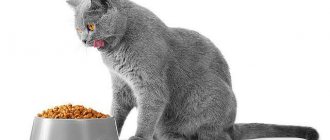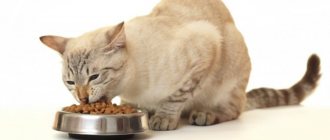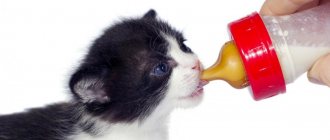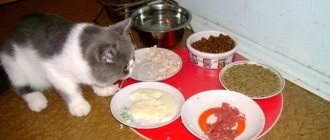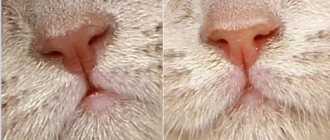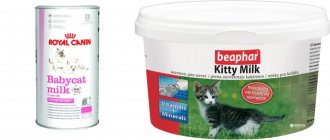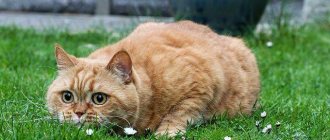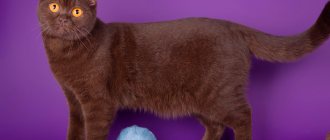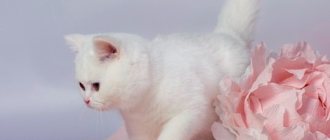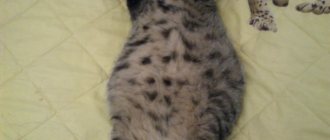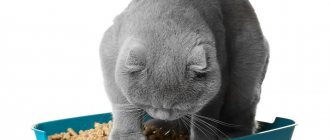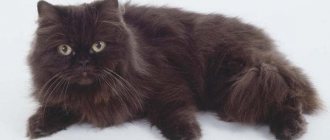British is an artificially bred breed. Not all foods that are fed to barn cats are suitable for her. The health and longevity of the pet depends on how responsibly the owner approaches the preparation of the diet. And for kittens, proper nutrition is doubly important. Therefore, when it comes to feeding, recommendations from veterinarians and experienced breeders of British cats will not hurt.
Choosing a place and utensils for feeding
A British cat should have a separate place for eating. Important terms:
- safety;
- comfort;
- privacy;
- availability.
You should not feed your Briton in a hallway where people often walk, or in a room with a TV constantly on. Extraneous noise will distract the cat.
For your information. If there is already a pet in the apartment, it is better to feed the kitten separately at first. Otherwise, the older pet may take the food away from him.
British cats are best fed from deep stainless steel or ceramic bowls. The dish should be wide enough so that the mustache does not rest against the sides. After each feeding, the bowls are washed, and the area where the cat ate is wiped with a damp cloth. You can put oilcloth or a rubber mat there - this will greatly simplify cleaning.
Natural diet
Many owners prefer to feed their British cat natural food at home. It is believed that this is the most physiological type of nutrition. Cats are carnivores by nature, so their diet must include meat and other products that are available to animals in the wild.
What foods should be given?
The basis of the diet (60-70%) of British shorthair and longhair cats is made up of lean meats - beef, chicken, turkey. Lamb, pork, geese and duck meat are too fatty, so they should not be fed to pets.
About 2 times a week the menu includes offal:
- boiled liver;
- heart;
- kidneys;
- lungs;
- language;
- chicken stomachs.
They provide the body with amino acids and add variety to the daily menu.
Another important component of the diet (25-30%) is vegetables, fruits and herbs. These are sources of vitamins, minerals and dietary fiber.
It is useful to feed British cats:
- carrots;
- cucumbers;
- asparagus;
- pumpkin;
- zucchini;
- apples;
- apricots;
- sprouted oats;
- lettuce leaves;
- dill
Vegetables and herbs are given in the form of salads or mixed into meat. Fruits can act as treats.
Once every 3-4 days, British cats are fed boiled sea fish. It must be cleaned of bones and scales.
At home, British cats are also fed fermented milk products: low-fat kefir, cottage cheese, curdled milk, natural yogurt. Once a week they pamper you with grated cheese.
Important. Only kittens can be given milk. It is usually not absorbed by adult cats.
To provide your pet with additional energy, the menu includes rice and buckwheat porridge. They account for 5-10% of the total food volume.
British cats are fed chicken or quail eggs 2-3 times a week. These products do not need to be boiled if the owner is sure that they are not contaminated with pathogenic bacteria.
It is preferable to use only the yolk. It is given separately or mixed with fermented milk products.
For your information. If you feed your British cat correctly, she will have a shiny coat, clear skin and clear eyes.
Rules and regulations for preparing natural food
If you feed a British cat natural food, you should adhere to the following rules:
- British cats are fed only fresh food. You can freeze a few portions for an emergency, but you can’t use this method all the time.
- Meat can be given raw, but first it must be scalded with boiling water or frozen for 2-3 days. This is necessary to destroy parasites.
- The British are fed thick food at room temperature. If the food was in the refrigerator, it must be reheated.
- Vegetables, meat and fish are not mixed with fermented milk products.
- Meat is given along with vegetables and herbs.
The daily feeding rate for British breed cats is about 5% of their weight, or 40-60 g of food per 1 kg of weight. The serving size is adjusted according to the age, activity level and individual characteristics of the animal.
Important. British cats are prone to obesity - they should not be overfed.
Predator instinct
Even though your kitten is still very young, do not forget that he is, first and foremost, a predator. And only then - an affectionate pet.
Representatives of the cat family living in the wild are nocturnal. That is, at night - hunting for "game", and during the day - sleep. Therefore, those cats that are lucky enough to live in comfortable home conditions retain their instincts and associated behavioral characteristics. Based on this, the kitten’s diet should be as close as possible to the food that feline predators eat. And since no one has ever seen a tiger cook buckwheat porridge for himself, and a lion decide to eat pasta, we conclude that it is preferable to feed both kittens and cats meat.
Ready-made feed
Many owners prefer to give their Britons dry food and wet canned food - it’s convenient and simple. But the products must be of high quality - not lower than premium.
It is better to avoid buying cheap food from the nearest supermarket. Economy class food contains practically no natural meat. But they contain ballast substances, dyes, flavors and other harmful components.
You should carefully study the composition of the feed. Meat should come first. Good products contain vitamins, minerals and amino acids that support the health and strengthen the immune system of the British cat. A minimum of carbohydrates is encouraged - they lead to weight gain.
Selection of industrial feed
Owners of British cats consider the following brands to be the best food:
- Earthborn Holistic;
- Go! Natural Holistic;
- Bosch Sanabelle Grande;
- Acana;
- Orijen;
- Eukanuba;
- Eagle Pac Cat Holistic;
- 1st Choice.
This is a super premium class and holistic food. They are quite expensive, but their composition fully satisfies the needs of the cat's body.
If your budget is limited, you can purchase premium food for the British:
- Purina Pro Plan;
- Brit Premium;
- RoyalCanin;
- Hill's.
The Royal Canin company produces a special food for British kittens that can be fed to babies aged 4 to 12 months - British Shorthair Kitten. It is highly digestible and contains prebiotics that support the functioning of the gastrointestinal tract.
Royal Canin produces British Shorthair Adult food for adult cats. It helps Britons maintain muscle mass. Omega-3 fatty acids strengthen joints and maintain their mobility.
For kittens, pregnant, lactating, spayed, neutered, elderly cats or pets with any diseases, buy food from specialized lines. All well-known manufacturers have such names.
Before choosing food for your British cat, it is better to consult a veterinarian. He will give individual nutritional recommendations.
Features of care
Before a four-legged purring baby appears in the house, you need to take care of his dowry and inheritance. Nothing special, caring for kittens of the British breed is quite simple, but for a small family member these little things are extremely important to feel right at home. So, things are mandatory in everyday life.
Bowls - you need to buy at least two of them. Actually, you need three: for water and different types of food. But for starters, two will be enough, because until six months the food will not be too varied. However, later you will need three or even more.
The tray can be anything. There is only one requirement for it - it must wash well and be stable. Therefore, it is better not to take cheap plastic trays; they are too light and scratch quickly, and dirt accumulates in the scratches, which is difficult to wash. The British kitten is very clean, caring for it mainly consists of maintaining cleanliness
And this is no less important than proper nutrition. A scratching post is desirable. But you don’t have to buy it - you can do it
Some craftsmen decorate walls and furniture with materials that can be sharpened with claws. This option is in some ways even better than a separate scratching post, because you can track where the baby prefers to sharpen his claws - and not prevent him from doing the right thing in his favorite place. If this is not possible, then you must buy a special scratching post. A place to sleep: it can be a house, a box, a basket, a bed. Here the imagination is limitless. But you should keep in mind that the cat may not immediately like the proposed place to sleep: most likely he will get used to it later. But you shouldn’t rule out the option of replacement: if the kitten really doesn’t like the place, there’s no need to insist.
Optional but desirable accessories
- Carrying must be in the house. Even if the cat is completely domestic, trips to the vet will still be required. The animal will be calmer in the carrier. When he grows up, such trips will become familiar to him thanks to this “travel house.”
- Toys - there can be as many of them as you like. They can be anything. But they must be, because the baby - the British kitten will play in any case. If there are no toys under his paws, he will play with your things.
- Special comb, brush and rubber glove. Grooming is not just for long-haired breeds. Shorthaired Britons also need it, only less often. You need a metal comb, but not with sharp or fine teeth. The brush should have a massage effect and natural bristles.
What if the baby gets sick?
The baby is sick.
First aid kit. Of course, the future family member is healthy. But you should definitely have a first aid kit - not just for emergencies. It’s more likely not even a first aid kit, but a cosmetic bag. There should be cotton pads and hydrogen peroxide. After all, part of grooming is examining and cleaning the ears. There should also be high-quality shampoo - you need to wash your cat once every three months, this is part of the mandatory care for the animal. Medicines in the first aid kit should only be those that have a sufficiently long shelf life. Most vitamins and preventive medications should be fresh. But chamomile herb, propolis tincture, petroleum jelly, antiseptic sprays can be stored for quite a long time. In addition, the first aid kit should always contain disposable syringes, disposable diapers (it’s good to put them in a carrier in case of a trip), cotton swabs, a pill dispenser, pipettes, and small enemas. You can consult your veterinarian about the contents of your first aid kit. And at the same time, ask more precisely how to care for a British kitten.
British kittens
Before a new family member arrives at home, you need to think through the areas of the entire apartment or house. After all, the baby will not sit in one corner. Separate space must be allocated for food and toilet. They should be at a distance from each other and always in a fairly secluded place: not on the aisle, away from the doors. When choosing a place for food and toilet, you should remember that even the most well-mannered cats can get dirty. Therefore, the floor under the feeders and tray should be well washed; there should be no rugs there.
Mixed feeding
Breeders and felinologists do not recommend feeding the British cats both natural food and industrial food. This is fraught with problems with digestion and urination. In addition, it will be difficult for an inexperienced owner to balance the diet and calculate its calorie content.
Sometimes a British cat can still be given different types of food, but this needs to be done at different feedings. For example, offer your pet dry kibble in the morning and meat in the evening. But it is not recommended to practice this method constantly.
Algorithm for switching to a different diet
A British cat cannot be suddenly switched from dry food to natural food, and vice versa. Sudden changes in diet disrupt the functioning of the digestive system.
New food is introduced gradually over 10-14 days. First, 25-30% of the usual food is replaced, and the rest of the food is left the same.
After 2-3 days, the proportion of unfamiliar food is increased by another 10-15%. This is done until the British cat completely switches to the new diet.
During the process, the condition of the animal is closely monitored. If allergies, indigestion or other negative reactions appear, return to the usual menu. In such situations, the cat is taken to the veterinarian so that a specialist can help choose the appropriate diet.
Often British people refuse to eat natural food after ready-made food. In this case, you can give your cat a fasting day. Most likely, when she gets hungry, she will eat whatever her owner offers.
Safety first
Take care of the safety of the chosen toy for your kitten, because they are like children. There should be no parts that a Briton can swallow: excess fluff, elastic, shiny, small beads. Toys should be soft and made of good fabric. Avoid purchasing hard or sharp toys.
Make sure everything in the house is safe for the kitten:
- Close access to all the cracks where a Briton can climb in and not get out until he grows up;
- Keep the bags out of the reach of kittens, because they are such little naughty creatures, while playing, they can get stuck there and suffocate;
- Cover your trash at night. A British person will not be tempted to find and eat a sausage roll;
- Place nets on the windows so that the Briton does not stare at the bird and fly away with it;
- Don’t leave threads, raindrops, or balls in a place accessible to a Briton; he can easily eat it all;
- While the Briton is very small, be careful. He remembers that you may not notice him, step on him, sit down, lie down;
- Before the first vaccination, try to limit your pet’s contact with other animals and various objects from the street;
- Do not leave chemicals or detergents open or unattended;
- It is better to keep dry food in the pantry away from the cat.
Vitamins and mineral supplements
If a British cat is fed natural products, vitamin and mineral complexes must be included in the diet. Many owners use natural supplements:
- Brewer's yeast;
- bone meal;
- fish fat.
The dosage appropriate for a particular pet is determined by the veterinarian.
A couple of times a year, it is beneficial for British cats to drink complex industrial supplements. They are used in courses of 1-3 months. Continuous use is fraught with health problems.
The following brands of vitamins have proven themselves to be effective:
- 8 in 1;
- Kitzyme;
- Gimpet;
- Omega Neo;
- Sanal;
- Veda Biorhythm;
- Canina.
There are also drugs on sale to eliminate problems with hair, internal organs, etc.
Water in the diet
British cats should always have access to clean water. It is renewed 1-2 times a day - aristocratic Englishmen often refuse to drink stale liquid.
Water is especially necessary if the cat is fed dry kibble. They are dehydrated, so the pet drinks 2-3 times more than when eating natural food.
It is not recommended to give tap water to animals. It contains chlorine and other harmful impurities. Therefore, it is pre-filtered and settled. Some owners buy bottled water. Naturally, without gas.
Important. If a British cat drinks little, she may develop urolithiasis. This pathology especially often appears after castration.
Vaccinations
Do not forget that the British breed was bred almost artificially. Animals of this breed have weak immunity. Don't neglect vaccinations ! In fact, this is very important. Already in the period from two to three months, a kitten can be vaccinated. This will protect him from many diseases. Before visiting the veterinarian, give your pet an anthelmintic drug ten days in advance; if after ten days no helminths are found, then you can safely visit the veterinarian.
After the first vaccination, the second one is given, exactly twenty-one days later. The same vaccine is administered, and after fourteen days immunity is developed. Repeated vaccinations are recommended every year.
What to feed a British kitten
For the first month after birth, a Briton feeds exclusively on mother's milk. It provides babies with all the necessary substances and promotes the formation of strong immunity.
If there is no mother, British kittens should be fed with cat milk substitutes, which are sold in veterinary pharmacies. It is not recommended to give baby food. It is designed for people, not animals.
A one-month-old kitten begins to be fed breast milk in the intervals between meals. The baby is carefully introduced to solid food so that at 2-3 months he is ready to move to a new home.
For your information. The British Fold kitten, which is usually a mix with the Scottish Fold, is fed the same as a straight-eared kitten.
An approximate feeding schedule for a British kitten by age is presented in the table.
| Age | Number of feedings per day | Diet |
| British kittens: 1 month | 3-5 | · small pieces of beef; · porridge with milk; milk for kittens |
| British kitten: 2 months | 6-8 | · small pieces of beef; · low-fat cottage cheese; · porridge with milk; milk for kittens |
| British kitten: 3 months | 6 | from three months, chicken, vegetables and egg yolk are introduced into the diet, and milk for kittens is replaced with goat or cow milk; other products remain unchanged: pieces of beef; · porridge with milk; · low-fat cottage cheese |
| British kitten: 4-6 months | 5 | A British kitten at 4 months is gradually weaned off whole milk and switched to fermented milk products, the diet is enriched with: · offal; · boiled sea fish; · fruits |
| British kitten: 6-10 months | 3-4 | · all types of lean meat; by-products; · porridge; · vegetables, fruits, herbs; · dairy products; · eggs; boiled sea fish |
From 10-12 months, British kittens are fed twice a day. Now they eat the same foods as adult cats.
An alternative option is to use ready-made feed. Canned food and dry granules can be given to a small kitten of two months. The “drying” is soaked in water or milk so that the baby can chew it.
Gradually increase the proportion of dry food in the diet and reduce the amount of wet food:
- British: 3 months – 90% wet/10% dry;
- British: 4-6 months – 70-80% wet / 20-30% dry;
- British: 6-10 months – 60-70% wet / 30-40% dry;
- British: 10-12 months – 50-60% wet / 40-50% dry.
From the age of one year, the pet is given 30% wet food and 70% dry food. It is desirable that the products are from the same manufacturer. This minimizes the risk of digestive problems and allergic reactions.
The daily feeding rate for a British kitten is about 10% of its weight. When feeding dry food, follow the manufacturer's recommendations.
What about milk?
There is an opinion that as soon as a kitten appears in the house, it urgently needs milk. And as if it is exactly what you can feed a British kitten.
This is partly true. However, milk can only be given to kittens up to three months - it is very useful for growing bones. After three months, it is better to exclude milk from the cat’s diet, since the stomach of a growing pet may react to milk protein with an upset.
If you really want to pamper your baby with dairy products, opt for low-fat kefir, and it’s better to let it sit in the refrigerator for several days and “grow old.” Fresh kefir can cause diarrhea in purring dogs of any age. In addition, kittens can, and even need, low-fat cottage cheese. But if you have a British Fold kitten, any dairy products are strictly contraindicated for him! The fact is that dairy products contain quite a lot of calcium, which, most likely, will negatively affect the shape of your fold's ears, and they may straighten.
Feeding an older cat
With age, British cats become less active, and metabolic processes in their bodies slow down. To prevent them from gaining weight, the caloric content of their diet is reduced.
The British cat is fed small meals 3-4 times a day so as not to overload the digestive system.
To improve intestinal function, some meat is replaced with vegetables. They contain fiber, which stimulates the gastrointestinal tract.
You need to carefully ensure that your pet consumes enough fluid. Many owners install drinking fountains. It has been noticed that cats drink from them more willingly.
When fed commercial food, an aging pet is switched to products from lines for older cats. If dental problems appear, the cat is given more canned food and pates, which are easier to chew.
If any illness occurs, veterinarians prescribe a special diet for the British.
Reasons for addiction to milk
First of all, milk is a tasty product. The cat understands perfectly well that milk contains a huge dose of protein, which is easily absorbed by the body not only of animals, but also of humans. In addition, milk contains a decent range of essential vitamins, methionine and choline (improves liver function) and calcium, which is an essential element in building strong bones. That is, milk is not only tasty, but also a healthy product.
Now we need to figure out whether it is possible to give milk to a cat?
And why is there an opinion that this product should not be included in a pet’s diet? The fact is that milk contains lactose. It is a sugar that consists of one molecule of glucose and a molecule of galactose. This element is present exclusively in milk. Lactase is a special enzyme that breaks down lactose into its individual components, which are then easily absorbed by the human body.
Lactase is produced in the cells of the mucous membrane of one of the intestinal sections. The amount of lactase in a cat’s body is at its maximum during childhood. However, over time, the concentration of the enzyme decreases due to age-related changes in the animal’s body.
This is a signal to stop milk consumption. The diet of an adult cat is somewhat different from the diet of an infant cat. But just in case, lactase continues to be produced in the pet’s body. But every cat is different. Contrary to popular belief, lactase production does not stop completely after the animal has matured.
In practice, it turns out that some cats drink a lot of milk, while others cannot tolerate it at all. Then their owners immediately perceive it a little differently. It is necessary to correctly assess the reaction of a pet to milk. If a cat has diarrhea, then they consider milk to be harmful. If the cat drinks milk with pleasure, then it will be useful, according to the owners.
Such owners will immediately begin to buy dairy products for their pet, although some of them may not be accepted by the animal’s body. In addition, a cat may love fermented milk products, but due to the characteristics of the body is not able to consume them. Therefore, you should carefully monitor your pet’s vital activity to determine its food preferences.
It should be noted that diarrhea is caused by a deficiency of the lactase enzyme in the animal's body. Lactose, which the body does not digest, binds water, thus causing diarrhea. And intestinal bacteria contribute to the fermentation of sugar, which causes the cat to experience colic and a bloated belly.
It is also possible that with a small dose of milk such problems may not arise. But it is best not to give milk to an animal whose body does not produce lactase in the proper concentration. This makes sense because milk companies have now been able to create lactose-free milk (the animal's body does not need to digest lactose by using lactase).
Such products have long been sold to people suffering from a similar problem.
Many people advise using goat's or sheep's milk instead of cow's milk, since it contains less lactose. The lactose concentration in cow's milk is 4.6%, in goat's milk - 4.5%, and in sheep's milk - 4.8%. Statistics show that you should not listen to the advice of others.
It is worth noting that cats, like people, can be intolerant to the protein found in cow's milk. This is called a milk allergy. In this case, it may be advisable to consume goat’s milk, which does not contain proteins that cause allergies.
More details about fermented milk products
Milk begins to ferment under the influence of lactic acid bacteria, yeast and fungi. Once in the animal’s body, all these components react with pathogenic microorganisms, increasing the level of the body’s defenses and eliminating various types of diseases.
Based on this, fermented milk products should occupy the top line in a pet’s diet. At least not a single cat’s natural diet is devoid of such products as cottage cheese, yogurt and kefir. But how do lactic acid bacteria act on milk so that it immediately becomes beneficial?
The bacterial fermentation procedure itself takes about 24 hours. During this period of time, proteins acquire a finely dispersed structure, which is good for absorption. For example, kefir is absorbed by the body by 91%, while milk by only 32%. Lactic acid gradually accumulates in the serum. It slows down the development of various types of putrefactive bacteria and has a positive effect on the growth of intestinal microflora.
That is why fermented milk products are recommended for people suffering from dysbiosis, which occurs against the background of systematic stress, poor nutrition, and taking medications.
When milk is fermented, the concentration of B vitamins (especially B2) increases sharply, and a mass of beneficial microorganisms accumulates. They create a protective barrier on the surface of the intestinal tract, which protects the cat’s body from the influence of harmful bacteria that can enter from the environment.
Prohibited Products
Most foods that people eat are not suitable for cats. The British should not be fed any salty, sweet, fried, fatty, smoked, or spicy foods. The cat's body is not adapted to digest such food, and the liver cannot cope with large amounts of toxic substances.
Also, the food of British cats should not include the following foods:
- River fish;
- tubular bones;
- sausages;
- semi-finished products, canned food and fast food;
- mayonnaise, ketchup and other sauces;
- chocolate, cocoa;
- eggplants, potatoes, legumes;
- mushrooms;
- citrus fruits, grapes, raisins;
- rhubarb, sorrel, onion, garlic;
- foods and drinks that contain alcohol, caffeine and other stimulants.
A British cat should not be fed food from the human table, even if it plaintively begs for a tidbit. Such handouts will result in serious health problems.
